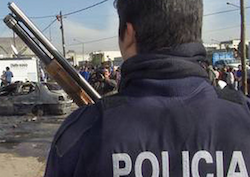The suspicious death of a police officer and a recent confrontation between border guards and allegedly crooked cops are adding to long-standing concerns about corruption in Argentina’s provincial police forces.
On August 10, Argentine authorities discovered the body of Lucas Muñoz, a provincial police officer who had been serving in the town San Carlos de Bariloche in Rio Negro province, near the border with Chile.
According to anonymous sources close to the investigation cited by La Nación, Muñoz was killed by fellow police officers because he had discovered evidence of their involvement in drug and human trafficking as well as accepting bribes to destroy evidence in murder cases.
The sources told La Nación that Muñoz had been tortured on police property before his death, though it remains unclear whether the beating Muñoz suffered was intended to make him reveal what he knew or to attempt to coerce him into helping cover up the other officers’ alleged misdeeds.
Muñoz had been missing for nearly a month before his body was found, just a few hours after the governor of Rio Negro met with top-ranking local police officials.
One source told La Nación that “the heads of several commissioners are going to roll” when the results of investigations of the incident carried out by the National Gendarmerie are made public in the coming days.
SEE ALSO: Coverage of Argentina
A week earlier, near the border with Bolivia in the town of Acambuco in San Martín province, a group of National Gendarmerie officers got into an altercation with a group of suspected drug smugglers that reportedly included members of the local provincial police.
According to a National Gendarmerie commander who spoke to El Tribuno, the gendarmes stopped a pair of trucks to conduct an inspection and found evidence of cocaine trafficking. When one of the gendarmes went to call for back up, the suspected traffickers accosted him.
El Tribuno reports that the suspected traffickers severely beat one of the gendarmes and took another hostage, whom they soon released, absconding with an estimated 600 kilograms of cocaine.
InSight Crime Analysis
These recent events serve as a reminder that police corruption remains a serious problem in Argentina, despite the country’s reputation as one of Latin America’s safer nations. The incidents also highlight how a variety of factors, including failed past reform efforts (pdf), make Argentina’s provincial police particularly susceptible to corruption.
SEE ALSO: Coverage of Police Reform
Argentina has long struggled with corruption in its provincial police forces. In 2004, a source who had worked with the Buenos Aires provincial police described the force to the New York Times as “a mafia in uniform.” A decade later, journalists Alejandra S. Inzunza and Pablo Ferri used that same term to describe the “bonaerense” in an article detailing corruption and brutality in the force. And in October 2015, the former chief of Santa Fe’s provincial police was handed a six-year jail sentence for collaborating with drug traffickers.
As Argentina’s organized crime landscape continues to evolve, it will be particularly important for the country to address corruption within its security forces — an issue that has contributed to the growth and persistence of criminal organizations across the Americas.

